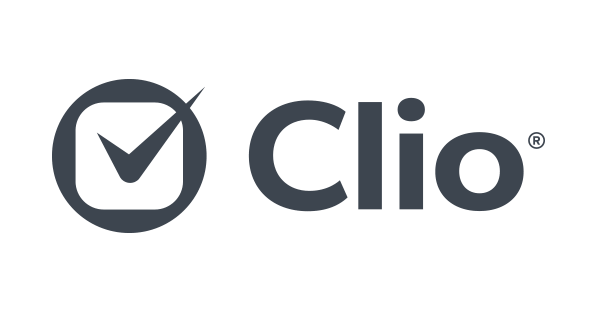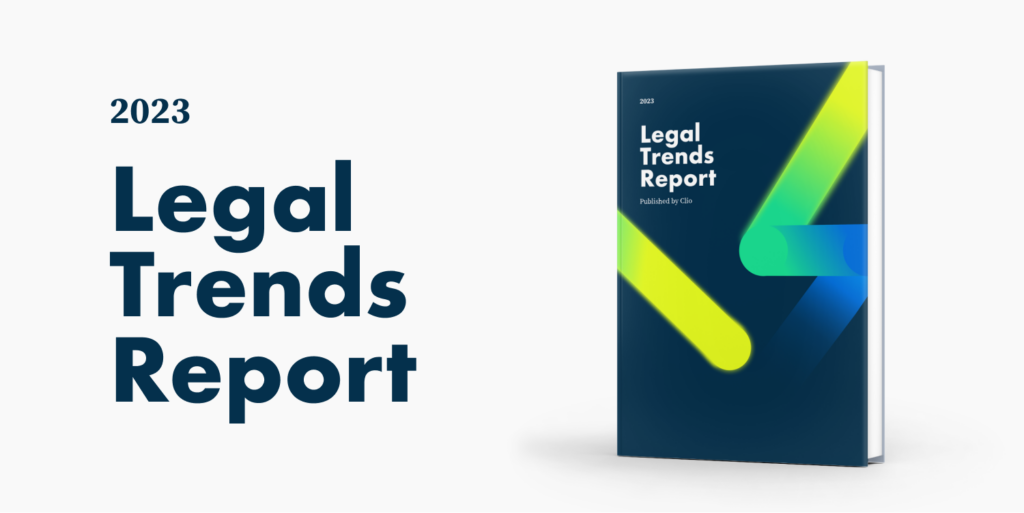Clio’s 2023 Legal Trends Report Unveils Surging Law Firm Productivity as the Legal Industry Enters into the Era of AI
October 9, 2023

In nearly a decade of tracking trends across the legal sector, Clio reports record productivity, as more legal professionals leverage technology to significantly impact their performance

The eighth edition of the Legal Trends Report is now available
Clio, the world’s leading provider of cloud-based legal technology, released its 2023 Legal Trends Report, revealing a remarkable increase in law firm productivity as technology adoption continues to rise. Legal professionals are actively embracing technology solutions to enhance workflow efficiency, boost financial performance, and optimize time management. With the advent of generative AI taking center stage this year, there is enormous potential to accelerate productivity even further.
“From rising inflation to keeping up with the rapid pace of technology innovation, the past year has brought no shortage of challenges and opportunities for law firms,” said Jack Newton, CEO and Founder of Clio. “Adaptability is more important than ever. Technology, including the rise of generative AI, continues to fundamentally change the legal landscape by helping legal professionals prioritize what matters most: achieving justice for their clients. This latest report fuels Clio’s commitment to ongoing innovation to best serve our customers in such a dynamic and promising time.”
Legal productivity is higher than ever before
Compared to 2016, the average legal professional earns more than two and a half times more revenue for their firm than they did in 2016. Productivity is at its highest point since the inception of this report, and while there is still room for improvement, there are key findings that support this trend:
Compared to 2016, on average, legal professionals are:
- Working over 25% more cases
- Logging 35% more billable hours
- Earning 158% more for their firms (72% after adjusting for changes in hourly rates)
More firms are adopting technologies to streamline administrative tasks, enhancing their ability to deliver superior client services and maximize revenue collection.
Lockup: A new metric to measure law firm financial health
New to this year’s Legal Trends Report is a metric to measure the financial health of a law firm: Lockup. Lockup measures how effectively a law firm bills and collects on its revenue, a crucial component of a thriving business. Minimizing lockup supports a healthy cash flow, giving law firms more cash on hand, and ensuring firms can pay their bills, minimize the risk of non-payment, and maintain more revenue to invest in future growth.
While lawyers are billing more of their work hours, the average law firm still only bills 86% of its billable work, leaving significant room for improvement. Additionally, too many firms find their revenue held in lockup—the period in which billable work is unbilled and uncollected.
- The median amount of realization lockup that firms carry is 38 days—or just over five weeks worth of annual revenue
Minimizing lockup will support a healthy cash flow, giving firms peace of mind in being able to pay expenses, minimize the risk of not getting paid, and have more revenue available to invest in future growth.
Law firms are improving their bottom line through online payments
Billing and payment processes have historically posed significant challenges for law firms when interacting with their clients. However, the adoption of online payment options has considerably alleviated the friction clients experience when settling their legal bills.
Today, law firms that have implemented online payment solutions get paid twice as fast. Firms utilizing online payment methods boast a median turnaround of just seven days, whereas those who have not embraced online payments still contend with a considerably longer wait, averaging approximately 15 days for bill settlement.
Embracing innovation in the era of AI
The positive outcomes from technology adoption are motivating a portion of the legal industry to enthusiastically embrace innovation. Those who continue to lag behind, failing to meet evolving client expectations, risk being left in the wake of industry advancements. This divide could become more prominent as the legal industry starts to embrace generative AI across the sector.
Legal professionals are interested in AI, but exercise caution
Generative AI has the potential to reimagine a wide array of tasks in a law firm, even in its earliest iterations. Most lawyers are at least aware of AI, and many see its potential.
- 63% of legal professionals said that they were interested in learning more about AI, representing a greater proportion than the general population—which includes both clients and potential clients—of which only 54% showed interest
- 58% of legal professionals don’t believe that AI is advanced enough to be considered reliable, and 39% say they don’t trust it
- 68% of lawyers, compared to 54% of paralegals and 48% of administrative staff, want to learn more about AI
With greater interest, lawyers may have an advantage in staying on top of the developments and opportunities available to lead and innovate in the space rather than having to catch up to evolving client expectations.
Lawyers and clients want transparency around the use of AI
Legal professionals see the potential benefit of AI in legal practice to improve the quality, affordability, and efficiency of legal services. When it comes to the potential risks that AI could pose, many legal professionals express concern over issues including confidentiality, client privacy, and copyrights.
- 21% of legal professionals think that AI will improve the quality of legal services, 31% believe it will make them more affordable, and 38% expect AI to improve efficiency
- 41% percent believe AI would open them up to too much professional liability, 57% are concerned about ethics issues with respect to client privacy and confidentiality, and 37% worry about the risks of copyright issues
- The majority (70%) of clients say they would want lawyers to disclose whether or not they use AI in their practice, and nearly half (47%) of legal professionals say they would definitely want their clients to know if they used it.
As firms weigh the risks and benefits of AI, transparency is top-of-mind for both lawyers and clients. Clients also see lawyers who choose to use AI as too busy and prone to error, which may be a perception that lawyers need to manage if and when they implement AI solutions in their practice.
Lawyers see more value in using AI for legal research than client communication
AI is viewed as a time-saving tool for legal research, but many lawyers remain cautious with respect to quality and the risks this could pose to client work.
- Nearly 1 in 5 (19%) of legal professionals say that they are using AI in some form within their practices
- Legal research is the most common application of AI
- Drafting documents is the second most common application of AI
- 40% of lawyers see potential value in using AI for legal research, saying it would dramatically improve efficiency
- Only 28% believe that AI would be reliable in performing legal research for a client, and 38% said that using AI would lead to too much error in legal research
Lawyers also show hesitancy to use AI for client communication. While 32% of lawyers agree AI can help reduce workloads, 38% think that generating email responses with AI will lead to too much error. Furthermore, 38% of lawyers believe that letting an AI respond entirely on a lawyer’s behalf would be unethical.
While the latest AI technologies have only just become available, many legal professionals have shown interest in its future adoption in legal practice. Regardless of perception or opinion, the use of AI is already well underway in legal practice.
“The entire legal industry is in the process of building a relationship with AI, ideally one that’s responsible, sustainable, and transformative,” continued Newton. “Understanding these insights, specifically around AI, supports the entire legaltech industry to innovate and make decisions with a clearer perspective of market dynamics. In publishing this report, we’re aiming to help create more successful firms, more impactful solutions, and broadly, a more informed understanding of a changing sector.”
The 2023 Legal Trends Report is now available at clio.com/ltr.